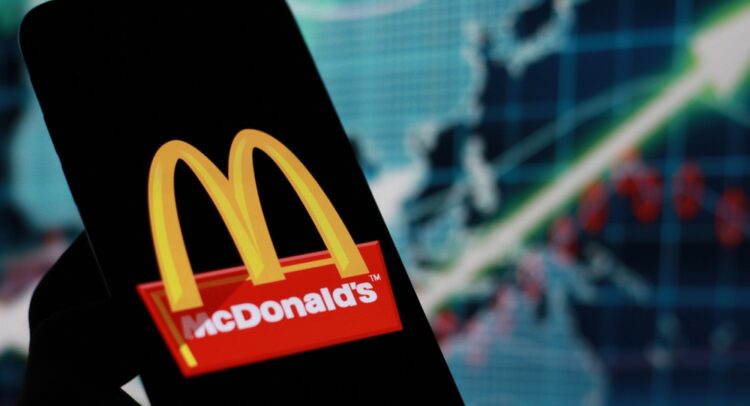McDonald’s (MCD) has established itself as a leading fast food restaurant that emphasizes affordable prices. However, the company’s status as a low-priced option has backfired and can inhibit the stock’s ability to outperform benchmarks like the S&P 500 and the Nasdaq Composite.
Claim 50% Off TipRanks Premium
- Unlock hedge fund-level data and powerful investing tools for smarter, sharper decisions
- Stay ahead of the market with the latest news and analysis and maximize your portfolio's potential
That’s certainly been the case for a while. McDonald’s 3% year-to-date decline and 32% gain over the past five years both underperform the major benchmarks. McDonald’s underperformance and slow growth prompt me to be bearish on the stock, especially with other opportunities present.
Inflation Has Taken a Toll on Growth
One problem with McDonald’s is that inflation has taken a toll on its growth. McDonald’s, like many companies, has raised the prices of products and services to keep up with inflation. It’s a natural response to the rising cost of materials, gas, and labor, but consumers don’t have to play along.
McDonald’s reported a drop in sales for the first time since 2020 in the second quarter. During that quarter, global comparable sales dropped by 1.0% year-over-year. While consolidated revenue increased by 1% year-over-year in constant currencies, that’s a reflection of the company’s new restaurant openings rather than the performance of its existing restaurant chains. Excluding constant currencies, overall revenue was slightly down year-over-year.
The fast food giant even brought back its $5 value meals to counter inflation. The company hopes to bring back budget conscious consumers with the offering.
Not Every Restaurant Chain Is Suffering
While it’s easy to point the finger at inflation, McDonald’s struggles don’t encompass the entire industry. Other fast food restaurants reported strong earnings that suggest more gains for long-term investors. High revenue and earnings growth were also more common among fast food restaurants that emphasize their selections of healthy foods.
For instance, Chipotle (CMG) crushed its earnings and delivered 18.2% year-over-year revenue growth in the second quarter. Comparable restaurant sales increased by 11.1% year-over-year compared to McDonald’s year-over-year decline in this area. Cava (CAVA) also expanded its market share with 14.4% year-over-year comparable sales growth in the second quarter.
Wingstop (WING), Sweetgreen (SG), and Texas Roadhouse (TXRH) also delivered double-digit year-over-year revenue growth in their most recent quarters. These companies continued to grow despite inflation, so it appears that there’s more to McDonald’s decline than inflation.
That should bother investors.
McDonald’s Is Losing Market Share to Health-Conscious Competitors
It would be easier to write this off as a cyclical event for restaurants if other fast food restaurants were struggling. While McDonald’s isn’t the only fast food restaurant that’s losing ground, it is ceding market share to rising competitors.
We have seen that people are willing to pay a premium for healthy food options. Fast food restaurants that have aligned themselves with better food options have had more flexibility with price hikes. For instance, Chipotle delivered solid results even after the company raised prices four times in two years and faced a controversy with reduced serving sizes. Part of the reason is that many people view Chipotle as the healthiest fast food restaurant. The company’s mix of healthy and tasty food has kept customers coming back amid price hikes and smaller servings.
McDonald’s faces an uphill battle with establishing itself as a premier choice for health-conscious consumers, as it’s one of the unhealthiest fast food chains right now. A lower quality product doesn’t give McDonald’s as much leeway to raise prices as rivals that have become known for offering healthy fast food meals.
Profit Margins Will Likely Fall
While revenue dropped year-over-year by a small amount, net income dipped by 12% year-over-year. Lower profits will elevate the P/E ratio and can make the stock overvalued. Furthermore, the company’s focus on value meals can put additional pressure on margins.
Since McDonald’s consumers don’t give the company as much leeway for price hikes as healthier fast food restaurants like Chipotle, the company is more limited in this economic environment.
The company currently has a 25 P/E ratio, which feels a bit high for a company that has been reporting low single-digit net income growth for a few quarters. Rising competition from faster-growing restaurant chains will put additional pressure on McDonald’s to resort to lower prices. McDonald’s hasn’t been able to win on quality. Lower prices for its products and fewer paths to price hikes suggest that McDonald’s can struggle with net income growth for several quarters.
Is McDonald’s Stock a Buy, According to Analysts?
McDonald’s is rated as a Moderate Buy among 25 analysts with a projected 2% upside from current levels. The stock has 17 buy ratings and eight hold ratings, and a 12-month forecast price target of $293.77.

The Bottom Line on McDonald’s Stock
McDonald’s looks like an attractive dividend growth stock due to its 2.31% yield and the high dividend growth rate it has maintained for several years. However, McDonald’s has underperformed the stock market for several years and looks destined to continue on that path.
Just as Nike (NKE) has lost ground against up-and-coming competitors, McDonald’s is also losing ground to Chipotle, Cava, and other fast food restaurants. McDonald’s has prioritized affordable food for many years, and that brand messaging has limited the company’s ability to hike prices. With high inflation still present, people are getting more defensive with their wallets. While people still pay premiums for healthy food, they aren’t going to pay extra for unhealthy food options.
















